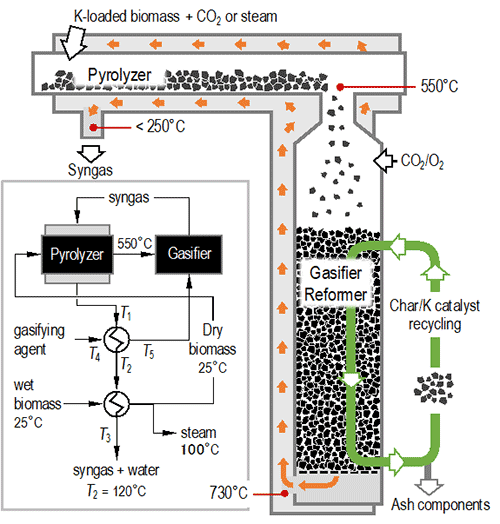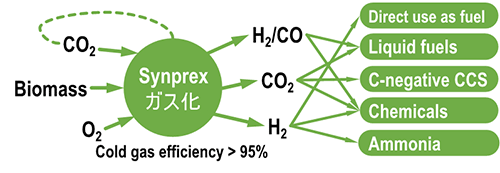Project Leader
R&D Areas
- JST TOP
- Strategic Basic Research Programs
- ALCA-Next
- Proof-of-concept of Green Gas Production by Thermochemically-recuperative Biomass Gasification
Full-scale R&D
Proof-of-concept of Green Gas Production by Thermochemically-recuperative Biomass Gasification

- R&D Period
- 2025.4-
- Grant Number
- JPMJAN25G2
Summary
This project aims at demonstration of the concept of a thermochemical regenerative gasification process (Synprex†) that converts biomass into synthesis gas and hydrogen with unprecedented energy efficiency, and design of a full-scale process 30,000 t-biomass/year. We will clarify the effectiveness of the new process principles included in Synprex (separation of pyrolysis from volatiles-reforming/char-gasification, application of potassium catalyst circulating in the reaction system, multi-stage decomposition/elimination of tar, and driving pyrolysis with sensible heat of syngas) through bench-scale tests on a 5 kWth scale, and demonstrate process performances such as syngas yield > 95% on LHV basis, tar concentration in syngas < 1 mg/Nm3, hydrocarbon concentration < 2%, potassium catalyst recycling, and avoidance of ash problems. We will also develop cutting-edge particle/fluid/reaction simulation methods that quantitatively explain the test results, and based on the results, we will create the basic design of a full-scale process (18,000 kWth).
It is expected that Synprex co-produces hydrogen, syngas and CO2 from forestry, agricultural and waste biomass, and by linking this with hydrogen production from renewable electricity and CO2 storage, it aims to meet green-gas demand (for liquid fuels and chemicals) from 2030 onwards and to introduce a carbon negative system to industries.

Synprex process concept

Role of Synprex in future industries
†Synprex is an abbreviation for Syngas production from biomass by pyrolysis-reforming complex and is a registered trademark of GPE Co., Ltd.
R&D Team
Leading Institution
Institute for Materials Chemistry and Engineering, Kyushu University
Collaborators
GPE Co., Ltd., Tajima Forest. Co., Ltd.
Affiliation and job title should automatically appear from the information that a researcher registered with researchmap.Data may be outdated or undocumented.
When there is not a connection via the internet, data are not displayed.





